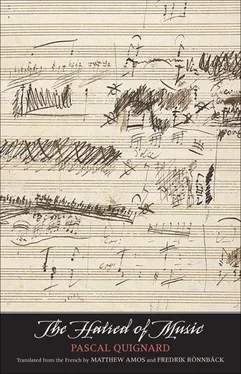These are otium . Empty hiding places subject to the archaic influence of the predations that formed them. Completely secular ecstasies. These are “dead intervals.” In all of Chrétien de Troyes’s romances, they are what the author profoundly refers to as “thoughts.” Thoughts are not ideological sequences. “Thoughts” are “eclipses.” Erec’s oblivion thinks. Yvain’s amnesia thinks. Lancelot, suddenly losing his name, thinks.

Perceval leans on his lance. He contemplates three drops of blood on the snow, which the whiteness and the winter cold are slowly drinking. Chrétien writes: “He thinks so much he forgets himself.”

Marcel Proust reconnected with this medieval stupor . The narrator of In Search of Lost Time , hunched over his boot in the Grand Hôtel in Balbec, cries out in tears: “Stag! Stag! Francis Jammes! Fork!”

The noise of the spoon tapping against the faience plate and, under the haze of the soup that it is trying to scoop, the design caught in the faience, which little by little will be revealed under the thick consistency, cannot yet be made out.
The spoon, tapping the container, chimes.
The spoon scraping, the stag at the bottom of the plate reemerges from prehistory.
The musical bow reemerges.
The hum resonates with the individual acoustic molecule, older than day. The old asemic string vibrates little by little to the harmony of the seemingly absurd semantic song that evokes it. Emotion overcomes us all of a sudden. Once more, everything suddenly disrupts all the rhythms of the body, but no real meaning has been provided.

Stupor . Falling into a faint. Faintness defines fainting. Saint Peter in Annas’s courtyard in Jerusalem. Augustine in the garden in Milan associating the crow’s caw with an old children’s song he had heard in Carthage and whose title he can no longer recall. Saint Augustine’s insomnia in Cassiciacum. The persistent murmur of the steam that disturbs him. The nibbling of the mice (and Licentius who sleeps next to Augustine and who taps with a piece of boxwood on the foot of the bed in order to scare them off).
The noise of the wind in the leaves of the chestnut trees in Cassiciacum.

There is an old French verb that expresses this drumming of obsession. That denotes this group of asemic sounds that disturb rational thought inside the skull and that awaken in the process a nonlinguistic memory. Tarabust , rather than hum, is perhaps the word that should be suggested. 11 Tarabustis is attested after Chrétien de Troyes, in the fourteenth century.
“Something tarabusts me.”

I am searching for the acoustic tarabuster that predates language.

Tarabust is an unstable word. Two distinct worlds meet in it, attract it, and thus divide it according to two processes of morphological derivation that are both too plausible for the philologist to decide between them. The word tarabust is itself disputed between the group of that which belabors and the group of that which drums. Between the rabasta group (the noise of quarreling, the belaboring group) and the tabustar group (hitting, talabussare, tamburare , the family of resonators, of drums).
Either vociferous human coitus. Or percussions of hollow objects.
Acoustic obsession is unable to distinguish in what it hears between what it ceaselessly wants to hear and what it cannot have heard.
An incomprehensible noise that belabors. A noise that could either be quarreling or drumming, panting or blows. It was very rhythmic.
We come from this noise. It is our seed.

Every woman, every man, every child immediately recognizes the tarabust.
Salmon swim upstream and back in time in order to die at the exact spawning ground where they were conceived.
And spawn, and die.
Bits of red skin fall to the bottom of the bed.

Werner Jaeger ( Paideia , Berlin, 1936, volume I, page 174) asserts that the oldest trace of the word rhythm in the Greek language is spatial. Jaeger, as Marsyas does with Athena’s flute on a riverbank in Phrygia, gathers the remains in a fragment by Archilochus:
Dare to know what rhythmos holds man in its net.
Rhythm “holds” man like a container. Rhythm is not fluid. It is neither the sea nor the pulsating song of the waves that come in, break, retreat, amass, swell. Rhythm holds man and attaches him like a skin on a drum. Aeschylus says that Prometheus is tied for eternity to his rock in a “rhythm” of steel chains.

Hums encrust the heart of man as quickly as rust encrusts iron.

There are things that we do not dare reveal to ourselves even in silence, even in our dreams. Phantasms are a kind of mannequin located behind images and memories, and which hold them upright. We are entirely obedient to them, although we dread glimpsing these ancient and rather obscene armatures on which our vision focuses and which preform it.
There are more ancient acoustic structures than these visual terrificatio . Tarabusts are the phantasms of rhythms and sounds.
Just as hearing precedes sight, just as night precedes day, tarabusts precede phantasms.
Thus the strangest ideas have a purpose, the oddest tastes a source, the most surprising erotic obsessions an irresistible horizon, panics an invariable vanishing point.
Thus the wisest animals can be fascinated and, paralyzed, await the death they fear and that comes to them in the form of a mouth that opens, that sings.

What is in my thoughts belongs only to me.
But the self does not belong to itself.
Phantasms are involuntary obsessive visions.
Tarabusts are the involuntary, besieging, tormenting, haunting acoustic molecules.

In the Odyssey , in the twelfth book, verses 160 to 200.
The Sirens are singing in a flowering meadow, surrounded by the remains of bones of consumed men.
It would seem that when we are still deep in our mothers’ sex, we cannot mold wax borrowed from beehives to make ourselves earplugs. (Bees around the garden flowers, wasps before the storm, flies in the rooms with open shutters, buzzing around, are the first tarabusters of the ears of the smallest children at the hour of the ritual afternoon nap.) We cannot not hear. We are tied hands and feet to the mast standing on the deck, minuscule Ulysses lost in the ocean of our mother’s womb.
What Ulysses says after the Sirens have sung and after screaming for the ropes that bind him to the mast, for pity’s sake, to be untied, so that he might immediately head toward the incredible music that fascinates him:
Читать дальше













